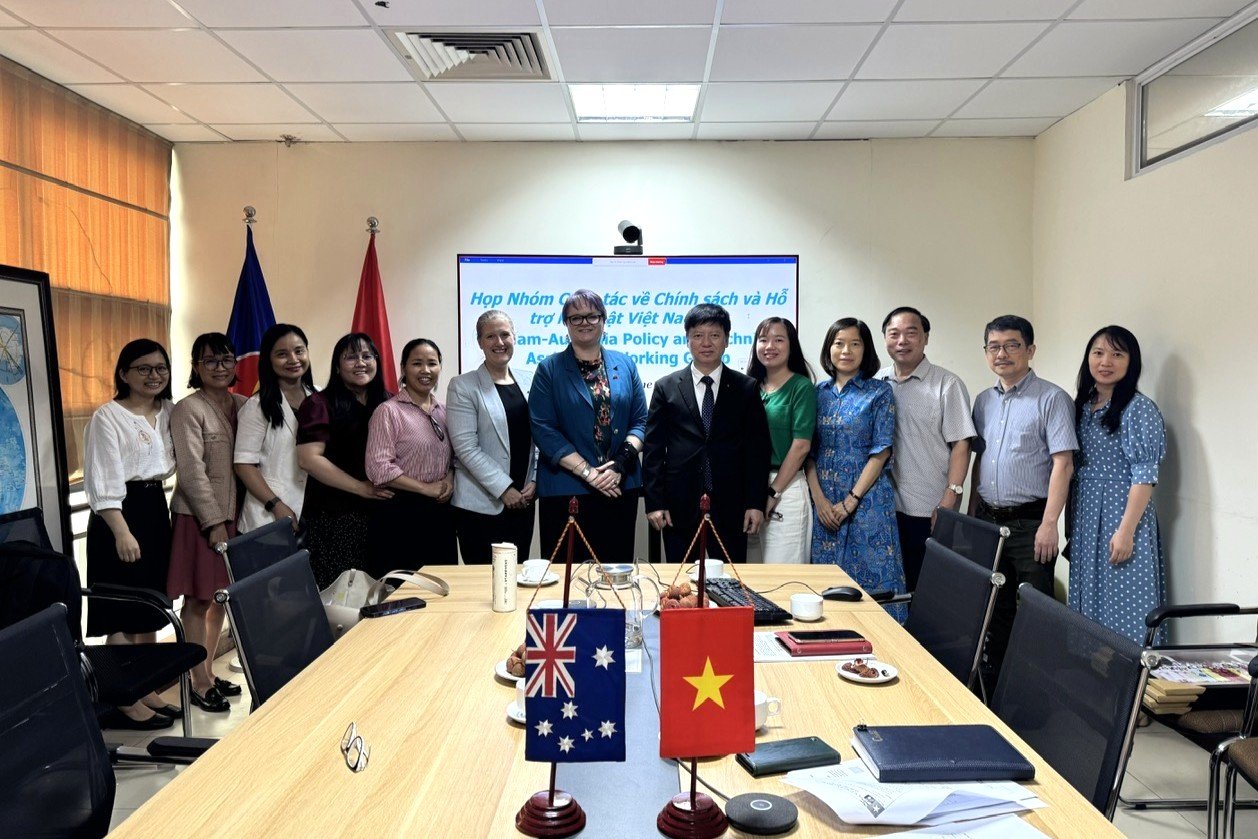December 30, 2025 | 18:17 GMT +7
December 30, 2025 | 18:17 GMT +7
Hotline: 0913.378.918
December 30, 2025 | 18:17 GMT +7
Hotline: 0913.378.918
On June 26, the Ministry of Agriculture and Environment, in collaboration with the Australian Department of Agriculture, Fisheries and Forestry and the Australian Embassy in Hanoi, held the 4th meeting of the Policy and Technical Support Working Group.
The meeting aimed to share Australia’s experience and policies on green agriculture, climate change adaptation, and disaster prevention and recovery. It also served to guide future policies and explore the potential for cooperation in the agricultural sector between Vietnam and Australia. Both sides worked to strengthen capacity-building efforts, reviewed the outcomes of the 3rd technical working group meeting, and proposed objectives for the next phase.

Mrs. Deb Langford, Assistant Secretary of the Australian Department of Agriculture, Fisheries and Forestry, and Mr. Pham Ngoc Mau, Deputy Director General of the International Cooperation Department, co-chaired the meeting. Photo: ICD.
Speaking at the meeting, Mr. Pham Ngoc Mau, Deputy Director General of the International Cooperation Department, emphasized Australia’s important role as a country with an advanced agricultural sector and extensive experience in natural resource management.
“We highly value the policy model lessons and technical support provided by our Australian partners, especially as Vietnam is actively promoting a transition toward ecological, circular, and sustainable agriculture,” Mr. Pham Ngoc Mau stated.
Reviewing the implementation of activities under the third Working Group meeting, the Australian side shared that they had supported Vietnam in enhancing the capacity of several laboratories under the Department of Plant Protection and Department of Animal Health. Both sides also co-hosted several specialized workshops and strengthened community awareness and capacity related to combating IUU (illegal, unreported, and unregulated fishing).
Vietnam expressed its gratitude to the Australian Government for consistently supporting the country in disaster response, notably as one of the first nations to stand by Vietnam and assist people affected by Typhoon Yagi with a contribution of AUD 3 million.
The Department of Agro-product Processing and Market Development proposed that Australia support the development of a capacity-building program for food safety testing of agricultural and aquatic products. This is seen as a key solution to protecting consumer health, improving the competitiveness of Vietnamese agricultural products, and increasing farmers' incomes.
The Department of Science and Technology suggested that Australia continue supporting scientific research and innovation aimed at mitigating and adapting to climate change, especially in the Mekong Delta, Central Highlands, South Central Coast, and Northern mountainous regions.
Additionally, the two sides aim to further promote the Aus4Innovation program, with a stronger emphasis on resilient agriculture and food, and responsible digital transformation including post-harvest technologies, traceability, and improving the quality of agricultural exports. This also includes research and application of advanced technologies, biotechnology, smart agriculture, and precision farming suited to Vietnam’s ecological and production conditions.
In the context of institutional restructuring, Vietnam is revising and updating many laws and regulations and is seeking support from international partners such as Australia. Therefore, Vietnam hopes Australia will be a partner in institutional development, science and technology, and trade capacity building, as proposed by the representative of the Institute of Strategy and Policy for Agriculture and Environment.
The Australian side reaffirmed its commitment to strengthening cooperation with Vietnam and stated that they would consult with relevant agencies to identify specific areas for support.
In November 2016, the Ministry of Agriculture and Rural Development of Vietnam (now the Ministry of Agriculture and Environment) and the Australian Department of Agriculture, Water and the Environment jointly organized the first High-Level Agricultural Policy Forum. This event marked a significant milestone in the bilateral cooperation between the two countries in the fields of agriculture and natural resources.
Following this forum, a Policy and Technical Support Working Group, along with two specialized working groups on Market Access for Plant-Based Products and Animal-Aquatic Products, were established to concretely implement the commitments and dialogue outcomes between the two ministries.
Announced in 2018, Aus4Innovation was designed to support Australia and Vietnam to jointly explore emerging areas of technology and digital transformation. Phase One helped trial new models for partnerships among key actors in the innovation system, and strengthen Vietnamese capability in digital foresight, scenario planning, commercialisation, and innovation policy.
Translated by Kieu Chi

(VAN) Located in three former provinces, Nam Dinh, Thai Binh, and Ninh Binh, and now in two provinces, Ninh Binh and Hung Yen, "Red River Delta" is the name of Vietnam's first interprovincial coastal wetland World Biosphere Reserve.
/2025/12/29/1046-1-210728_624.jpg)
(VAN) In 2025, Viet Nam recorded severe and extreme disasters, breaking multiple historical records and causing heavy losses in lives, property, and infrastructure nationwide.

(VAN) Applied technologies, water-saving irrigation is a strategic solution to promote climate-resilient agriculture and strengthen water security in the uplands.
/2025/12/29/3936-3-163422_251.jpg)
(VAN) Can Gio mangrove forest in particular and the entire Can Gio Mangrove Biosphere Reserve in general hold great potential for carbon credits.

(VAN) Chu Pah Rubber has announced its products that comply with the EU Deforestation Regulation (EUDR), affirming its commitment to sustainable production and product origin transparency.

(VAN) Deputy Director Nguyen Hoai Nam stated that a digital data platform will be developed with agricultural sector databases, utilizing AI to help farmers make informed decisions on 'watering correctly, sufficiently, and efficiently.’
/2025/12/29/4841-2-134224_777.jpg)
(VAN) From only about 10 individuals in 2009, the wild elephant population in Dong Nai has recovered to nearly 30 animals after more than 10 years.